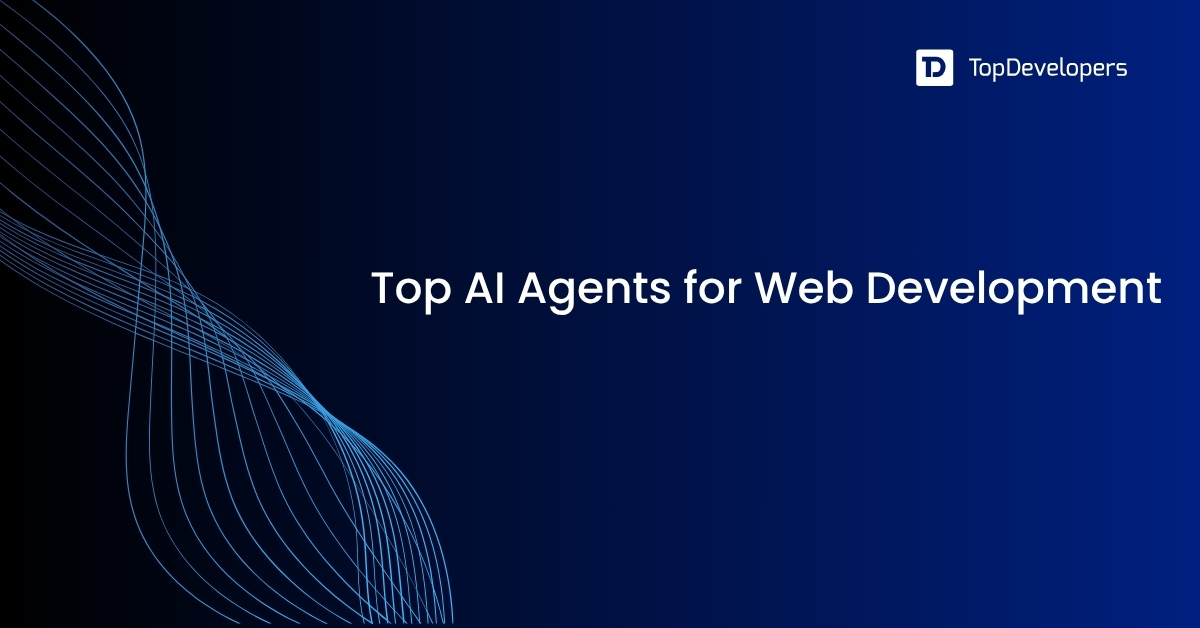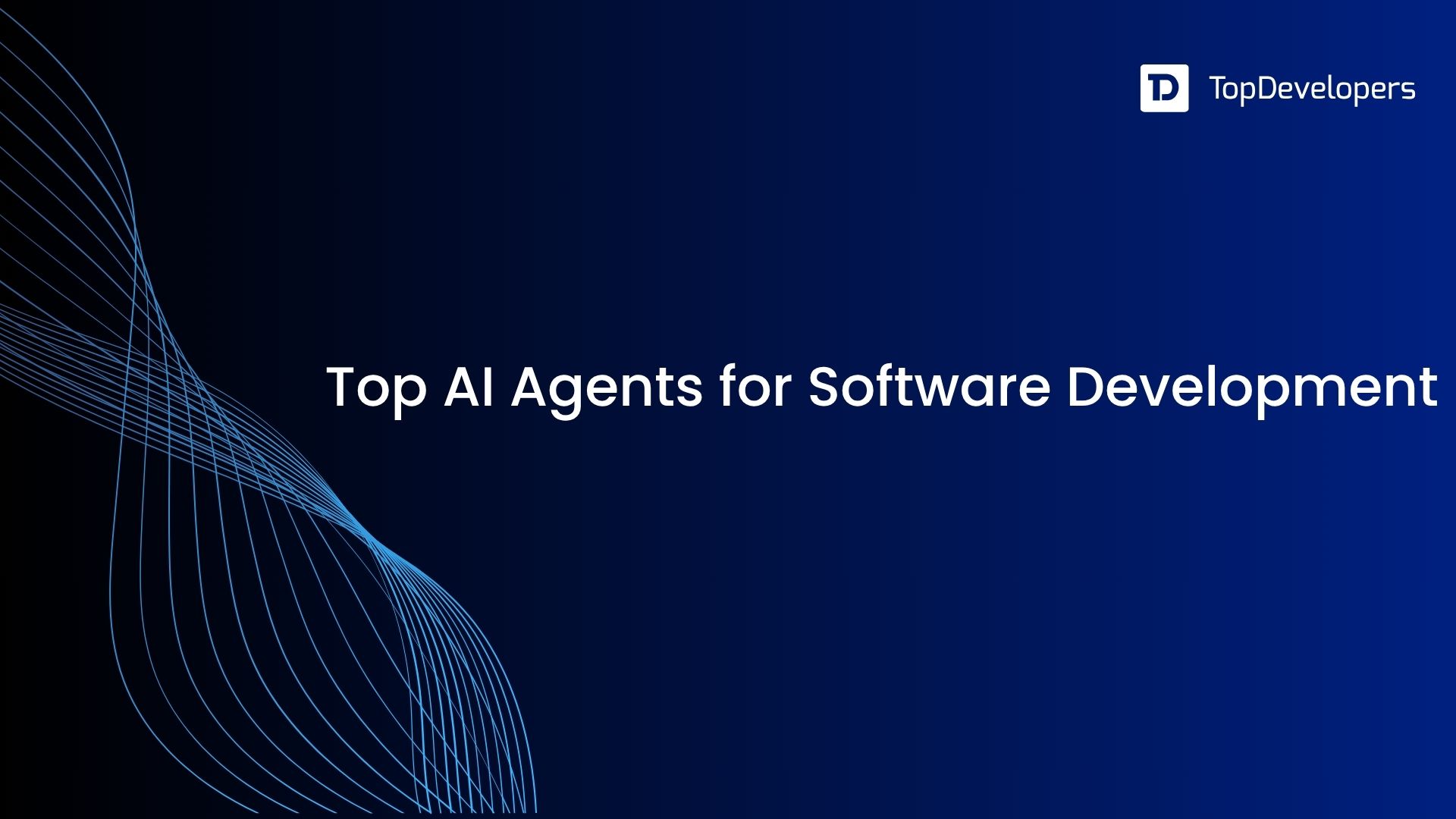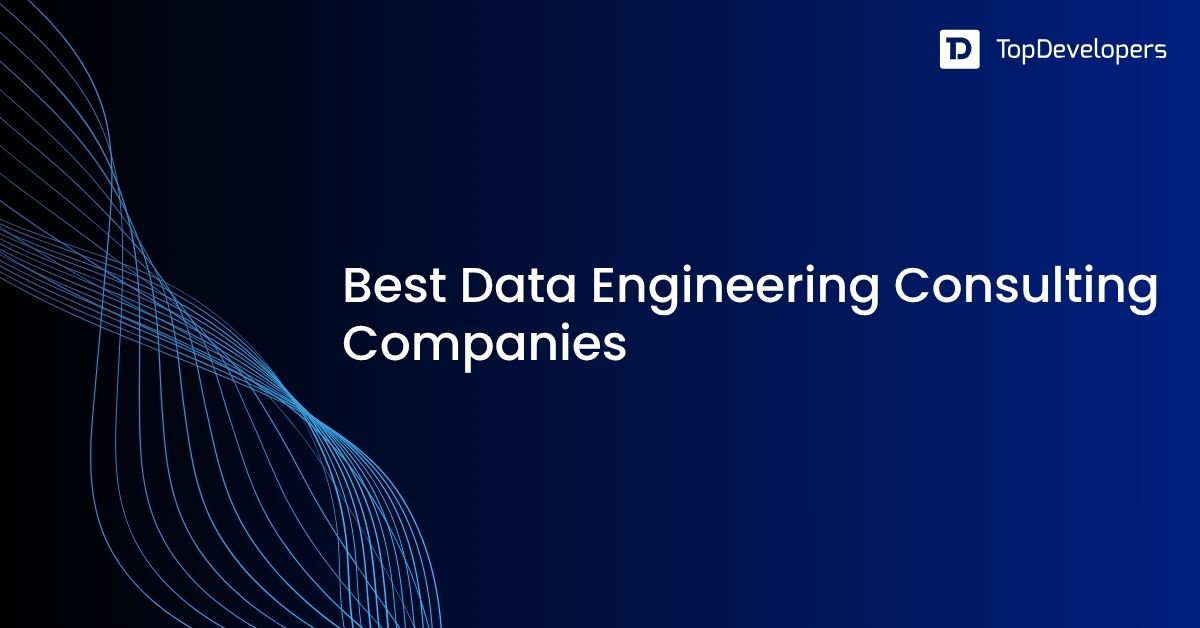
AI agents are no longer just buzzwords. They are becoming real digital teammates. These autonomous tools can think, decide, and act on tasks without requiring constant oversight. From customer service bots to fully self-operating research assistants, AI agents are transforming the way we work and create.
According to a recent report by Grand View Research, the AI agents market is projected to reach $50.31 billion by 2030, growing at a CAGR of 45.8%. That rapid growth is driven by smarter algorithms, better real-time decision-making, and enterprise-grade use cases across industries.
In this article, we are spotlighting the best AI agents to watch in 2025. These are the tools that stand out for their performance, innovation, and overall user value.
Here’s what you’ll find:
- A curated list of powerful AI agents
- Use-case-based recommendations
- Key features and access details
- A quick comparison to help you pick the right fit
Whether you’re a startup founder, solopreneur, or enterprise lead, there’s an AI agent here built for your goals.
Let’s dive into the future of autonomous productivity.
Table of Contents
10+ Top AI Agents in 2025
Here is the most promising list of AI agents making waves this year. Whether you’re building, scaling, or automating, these tools deliver real and practical value for every kind of team.
1. AgentGPT

Category: Browser-based autonomous agents
AgentGPT lets you create AI agents directly in your browser. You do not need to write code or go through a setup process. Just name your agent, define its goal, and watch it autonomously think, plan, and execute actions in real time. It simulates human-like decision-making and breaks down tasks step-by-step using an LLM-based reasoning loop.
The interface is clean and beginner-friendly, making it a perfect entry point into autonomous AI. AgentGPT is ideal for simple research tasks, content generation, or idea brainstorming. Developers can also inspect the logic behind each decision, giving it educational value too.
Best For: Startup founders, solopreneurs, hobbyists
Key Features:
- Goal-driven autonomous execution
- Web-based interface with live reasoning
- Simple input-output flow
- No backend required
Pricing: Free to try on browser; Pro version starts at $19/month
2. CrewAI
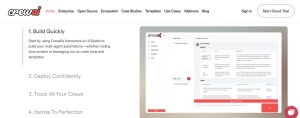
Category: Dev framework for multi-agent workflows
CrewAI helps developers create intelligent teams of AI agents that can collaborate and complete complex tasks together. It allows you to assign different roles to each agent, define specific responsibilities, and build structured workflows that mimic how real-world teams operate.
The system is designed with flexibility in mind. Developers can configure agents to communicate, hand off tasks, and make decisions based on shared context. This approach is ideal for use cases like content creation, data analysis, or multi-step automation, where one agent alone is not enough.
Because CrewAI is open source and Python-based, it offers full customization. You can integrate your own models, APIs, or tools into the workflow. It is especially useful for developers looking to scale agentic applications beyond simple tasks.
Best For: Engineers, AI developers, research teams
Key Features:
- Role-based task assignment
- Agent collaboration framework
- Python-first environment
- Easily integrates with LLMs like GPT-4
Pricing: Open-source and free; premium integrations in development
3. Google Jules

Category: AI Virtual Assistant
Google Jules is an advanced AI agent that combines conversational abilities with powerful data processing to provide personalized assistance across various industries. It is designed to help businesses manage customer queries, automate repetitive tasks, and offer tailored experiences to users.
Jules excels in natural language processing, enabling it to understand and respond to user inputs with context-aware interactions. It can handle complex tasks such as scheduling, answering product-related questions, and providing personalized recommendations based on real-time data.
This AI agent is highly scalable and integrates seamlessly with existing tools and workflows. It can be customized to suit different business needs, from customer support to internal productivity tools.
Google Jules helps businesses save time and reduce operational costs by automating routine tasks while maintaining a high standard of customer engagement. Its adaptability makes it a great choice for companies looking to enhance efficiency and user experience.
Best For: Customer support teams, businesses looking to automate workflows, productivity enhancement
Key Features:
-
Natural language understanding and generation
-
Seamless integration with Google services
-
Scalable for different business needs
-
Real-time data-driven insights
Pricing: Pricing available upon request; based on usage and integration requirements
4. Lindy

Category: No-code multi-agent platform
Lindy is designed for non-technical users who want powerful AI agents to handle everyday tasks without needing to code. It acts like a smart virtual assistant that can manage your inbox, schedule meetings, take notes, send reminders, and even follow up on conversations.
What sets Lindy apart is its no-code interface and easy setup. Users simply describe what they want done, and Lindy takes care of the rest. It supports multiple agents working together and can integrate with common tools like Google Calendar, Gmail, and Slack.
Lindy also learns from user preferences over time. It adapts to your communication style and work habits, making its assistance feel more natural and personalized. This makes it especially helpful for busy professionals who want to automate routine work and stay focused on high-value tasks.
Best For: Busy professionals, executives, non-tech teams
Key Features:
- No-code task automation
- Multi-agent orchestration
- Chrome and Gmail integrations
- Handles scheduling, emailing, reminders
Pricing: Free tier available; premium starts at $39/month
5. SAP Joule
Category: Enterprise AI Assistants
SAP Joule is an embedded AI assistant designed for the SAP ecosystem. It helps businesses make smarter decisions by analyzing real-time data and delivering insights through natural language. Users can ask questions or give commands, and Joule responds with context-aware suggestions across various SAP applications like S/4HANA and SuccessFactors.
It connects departments such as finance, HR, and supply chain, enabling seamless collaboration and automation. Joule uses a role-based approach, tailoring insights based on the user’s responsibilities and past activity. This improves efficiency and decision accuracy.
The assistant requires no coding skills and integrates directly into SAP’s existing workflows. With a focus on security and compliance, it supports enterprise-grade needs out of the box.
Best For: Large enterprises, corporate teams, SAP users
Key Features:
- Natural language interaction
- Cross-application integration
- Context-aware insights
- Enterprise-grade data security
- Real-time data analysis
Pricing: Included with SAP Business Technology Platform (custom pricing based on enterprise needs)
6. Kore.ai
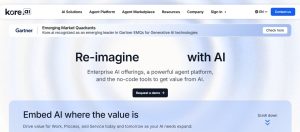
Category: Conversational AI platform
Kore.ai helps businesses build intelligent virtual assistants that understand natural language and respond with a conversational tone. These AI-powered assistants can handle both text and voice interactions, making them a valuable tool across multiple departments. Kore.ai is widely used in customer support, HR, and IT service management to automate repetitive queries, reduce wait times, and improve overall user satisfaction.
The AI platform comes with a powerful low-code interface that allows teams to create, train, and deploy virtual agents without needing deep technical skills. It also offers pre-built templates and industry-specific bots, making it easy to launch quickly.
Kore.ai supports over 100 languages and can integrate seamlessly with enterprise systems like Salesforce, ServiceNow, Microsoft Teams, and more. It also includes advanced analytics to monitor performance and continuously improve the assistant’s responses.
Best For: Enterprises, customer support teams, HR departments
Key Features:
- Pre-built industry bots
- Multilingual support
- Voice and chat-based conversations
- Seamless integration with CRMs and ERPs
Pricing: Custom pricing; free trial available on request
7. IBM watsonx Assistant

Category: Enterprise AI assistant
IBM watsonx Assistant is a powerful AI solution designed for enterprises that need reliable, scalable virtual agents. Built on IBM’s robust AI and data platform, it helps businesses automate customer interactions while maintaining a high level of accuracy and control.
It supports both chat and voice channels and can be deployed across websites, mobile apps, messaging platforms, and even contact centers. With built-in analytics and customizable workflows, watsonx Assistant allows teams to continuously refine how their virtual agents operate.
One of its biggest advantages is the ability to integrate with internal systems such as CRMs, ticketing platforms, and knowledge bases. Businesses can create assistants that not only answer questions but also take meaningful actions like processing orders, updating accounts, or troubleshooting issues.
Best For: Large enterprises, banks, telecoms, insurance firms
Key Features:
- Powered by watsonx foundation models
- Advanced analytics and AI tuning
- Integrates with Slack, WhatsApp, web apps
- Deployable on cloud or on-prem
Pricing: Tiered pricing starting with a free Lite plan
8. 11x

Category: AI sales agent
11x is an AI-powered sales development platform designed to automate outbound sales from end to end. It acts like a full-time SDR that reaches out to prospects, follows up, books meetings, and can even handle objection handling—all without human intervention.
The agent uses natural language models to craft personalized messages that feel human and relevant to each lead. It can send emails, schedule calls, and push data directly into CRMs like Salesforce or HubSpot. You simply set the campaign goals, and the agent runs your pipeline in the background.
What makes 11x stand out is its performance-first approach. It learns from every interaction, improves with time, and adapts its outreach strategies based on real engagement data. It’s like having an elite outbound team that never sleeps.
Best For: Sales teams, startups, lead gen agencies
Key Features:
- Full-cycle outbound sales automation
- Personalized outreach using LLMs
- CRM integration with Salesforce, HubSpot
- Dashboard for tracking conversions
Pricing: Starts at $499/month; performance-based pricing available
9. Decagon
Category: Customer support agent
Decagon is an AI-powered support agent designed to automate customer service with speed and intelligence. It understands user questions, resolves common issues instantly, and seamlessly hands off to a human agent when needed.
Unlike basic chatbots, Decagon uses contextual understanding and dynamic memory to hold natural conversations across multiple steps. It can handle inquiries about orders, accounts, subscriptions, and more, across multiple channels including chat, email, and social messaging.
Support teams can train Decagon on their help center articles, ticket history, and FAQs, allowing it to provide consistent and accurate answers. It also learns over time, improving its ability to deflect tickets and boost resolution rates without sacrificing user experience.
Best For: SaaS companies, eCommerce brands, support teams
Key Features:
- Context-aware ticket resolution
- Multichannel support (email, chat, social)
- Human fallback for complex cases
- AI-driven knowledge base integration
Pricing: Custom pricing based on ticket volume
10. AutoGen
Category: Python-based agent collaboration framework
AutoGen is an open-source framework developed by Microsoft that enables multiple AI agents to collaborate on complex tasks through structured conversations. It’s ideal for research and development environments where different agents need to work together, share knowledge, and reason through a multi-step process.
At its core, AutoGen lets developers define agents with specific roles, then connect them in a conversation loop. These agents can ask questions, suggest solutions, verify outputs, and escalate when needed—mimicking human collaboration. It also supports tool use and external API integration, making it flexible for advanced workflows.
AutoGen is particularly useful in areas like data analysis, code generation, and scientific research. It enables AI systems to go beyond isolated responses and instead build context-rich dialogue to solve harder problems.
Best For: Data scientists, AI researchers, developers
Key Features:
- Multi-agent collaboration workflows
- Open-source with modular design
- Supports LLM chaining and memory
- Great for experiments and prototyping
Pricing: Free and open-source (MIT License)
11. LangGraph
Category: Dev framework for agent workflows with stateful memory
LangGraph is an advanced framework that allows developers to build agent workflows using graph structures. It’s built on top of LangChain, giving it strong support for language models and memory-based logic. The core idea is to let agents move through a structured, stateful flow, similar to how real-world decisions are made with context.
Developers can design workflows as directed graphs, where each node represents an agent task or decision point. LangGraph makes it easy to handle branching logic, retries, feedback loops, and long-term memory. This makes it perfect for applications like report generation, research planning, or multi-turn reasoning.
It is entirely open-source and extensible. You can connect it with your favorite LLMs, APIs, and data sources, giving full control over how agents operate and evolve over time.
Best For: Developers, AI engineers, LLM app builders
Key Features:
- Graph-based agent orchestration
- Supports conditional flows and retries
- Built-in memory management
- Seamless with LangChain and OpenAI models
Pricing: Free and open-source; commercial hosting in beta
12. Genesys Cloud CX
Category: Customer experience AI platform
Genesys Cloud CX is a robust AI-powered platform designed to enhance every part of the customer journey. From routing calls to generating real-time summaries and coaching agents, it streamlines contact center operations with intelligence and precision.
The platform supports voice, chat, messaging, and social channels, all managed through a single, unified interface. It uses predictive AI to match customers with the right agents and automates common support tasks, helping reduce costs and wait times.
Genesys also offers strong analytics tools, letting businesses monitor sentiment, performance, and customer satisfaction. It is trusted by large organizations that need scalable, secure, and customizable solutions for customer engagement.
Best For: Contact centers, customer service leaders, enterprises
Key Features:
- AI call routing and summarization
- Voice bots and chatbots
- Sentiment analysis and agent assist
- Strong analytics and reporting
Pricing: Starts at $75/user/month; tiered plans available
13. Hyro
Category: Adaptive communications AI
Hyro helps organizations build conversational AI systems that adapt to real-world complexity. It’s especially popular in sectors like healthcare, where user questions can be unpredictable and data changes frequently.
Instead of relying on pre-programmed flows, Hyro uses natural language understanding and real-time data access to provide relevant, personalized responses. Whether it’s booking appointments, checking insurance eligibility, or answering FAQs, Hyro ensures conversations feel fluid and human-like.
Its plug-and-play design allows fast deployment across websites, mobile apps, and phone systems, while integrations with EHRs and CRMs help teams centralize information access.
Best For: Hospitals, public service agencies, appointment-based businesses
Key Features:
- Natural Language Understanding (NLU)
- Voice and text integrations
- Automated routing and scheduling
- Real-time updates from existing data sources
Pricing: Custom pricing; demo available on request
14. Conversica
Category: Sales and marketing AI agent
Conversica acts like a digital teammate for sales and marketing teams. It automatically engages leads, follows up on cold contacts, and keeps prospects warm while maintaining a natural and professional tone.
This AI assistant can handle two-way conversations over email, SMS, or chat and integrates seamlessly with CRMs and marketing automation tools. It knows when to engage, when to re-engage, and when to escalate to a human.
With Conversica, teams reduce time spent on manual outreach and focus more on closing deals. It’s especially useful for lead nurturing, post-event follow-ups, and reactivating dormant contacts.
Best For: B2B marketing teams, sales operations, RevOps
Key Features:
- Automated lead outreach and follow-up
- CRM integrations (Salesforce, Marketo, HubSpot)
- Multi-channel communication
- Human-like email and chat conversations
Pricing: Tiered pricing; starts around $1,500/month depending on usage
15. Observe.AI
Category: Voice agent assistant
Observe.AI transforms traditional call centers into AI-enhanced coaching environments. It listens to live or recorded calls, analyzes agent performance, and provides real-time feedback to improve conversations.
The platform uses advanced speech recognition and sentiment analysis to understand how customers and agents interact.Managers can flag issues, track compliance, and identify coaching opportunities at scale while eliminating the need for manual reviews.
Observe.AI also offers live agent assist tools that guide reps during calls, improving productivity and reducing errors in real time.
Best For: Call centers, quality assurance teams, CX leaders
Key Features:
- Live agent assist and coaching
- Call transcription and sentiment analysis
- Automated QA scoring
- Insights for training and compliance
Pricing: Enterprise-level pricing; demo available on request
Best AI Agents Comparison Table 2025
| Agent | Type | Best For | Code Level | Price Range |
|---|---|---|---|---|
| AgentGPT | Browser-based autonomous agent | Solopreneurs, students, hobbyists | No-code | Free / From $19/mo |
| CrewAI | Multi-agent dev framework | Engineers, researchers | Full-code | Free (open source) |
| Google Jules | AI Virtual Assistant | Customer support teams, businesses looking to automate workflows | No-code | Pricing available upon request |
| SAP Joule | Enterprise AI assistant | Large enterprises, SAP users | No-code | Custom (via SAP platform) |
| Kore.ai | Conversational AI platform | CX teams, HR, IT | Low-code | Custom pricing |
| IBM watsonx Assistant | Enterprise AI assistant | Enterprises, IT, telecom | Low-code | Free tier / Custom plans |
| 11x | AI sales agent | Sales teams, founders | No-code | From $499/mo |
| Decagon | Customer support agent | SaaS, eCommerce | Low-code | Custom pricing |
| AutoGen | Python agent framework | Developers, researchers | Full-code | Free (MIT License) |
| LangGraph | Agent workflow framework | AI engineers, LangChain users | Full-code | Free (open source) |
| Genesys Cloud CX | Customer experience platform | Enterprise contact centers | Low-code | From $75/user/mo |
| Hyro | Adaptive communications AI | Healthcare, government | No-code | Custom pricing |
| Conversica | Sales and marketing AI | B2B sales, marketing | No-code | From $1,500/mo |
| Observe.AI | Voice agent assistant | Call centers, QA teams | Low-code | Custom (enterprise-level) |
How to Evaluate AI Agents in 2025
Choosing the right AI agent is more than just picking a trendy tool. It’s about matching the technology to your workflow, team size, and user goals. Here’s what to look for when comparing today’s most advanced agents:
- Ease of setup and use: Look for agents that are quick to deploy and easy to manage. A simple user interface can make a big difference, especially for non-technical users.
- Integration capabilities: Check if the agent connects with your CRM, calendar, email, or support tools. The more seamless the integration, the better the overall performance.
- Intent understanding and NLP performance: Strong natural language understanding helps the agent respond accurately. Evaluate how well it handles complex queries and shifting context.
- Automation range: Consider the types of tasks it can automate and the channels it supports, such as chat, voice, email, or social media. A broader range means more coverage and better efficiency.
- Human fallback and oversight features: Reliable agents offer smooth handoffs to human support. Look for transparency, escalation options, and tools for monitoring performance in real time.
Conclusion
AI agents in 2025 are no longer simple chatbots. They are evolving into reliable digital teammates that can think, act, and collaborate. These tools are helping teams save time, reduce costs, and unlock new levels of productivity.
Your best pick depends on your role and goals. Developers may prefer flexible frameworks like LangGraph or AutoGen. Founders and CX leaders might lean toward no-code options like Lindy or Kore.ai. Sales teams can benefit from focused agents like 11x or Conversica.
No matter your industry, now is the right time to explore AI agents. The technology is more powerful, accessible, and scalable than ever. Starting today means staying ahead tomorrow.
FAQs Regarding AI Agents
What is an AI agent?
An AI agent is a digital tool that can make decisions, complete tasks, and work toward goals without constant input. It uses artificial intelligence to think, plan, and act based on the instructions it receives.
Which businesses benefit the most from AI agents?
Customer support teams, sales departments, and service-based businesses see the biggest gains. AI agents help reduce workload, speed up responses, and improve user experience at scale.
How are AI agents different from chatbots?
Chatbots usually stick to prewritten scripts and handle simple tasks like answering FAQs. AI agents, on the other hand, can think through problems, adjust to new situations, and carry out more complex actions without being told exactly what to do.
Do AI agents replace human workers?
AI agents are not meant to fully replace people. They take over repetitive tasks so humans can focus on creative, strategic, or complex work. In most cases, they act as support, not substitutes.
Are there privacy or security concerns with AI agents?
Yes, there can be risks if AI agents handle sensitive data. It’s important to choose tools with strong encryption, clear data policies, and human oversight. Always check how the agent stores and uses information.
Avantika Shergil is a technology enthusiast and thought leader with deep expertise in software development and web technologies. With over 8 years of experience analyzing and evaluating cutting-edge digital solutions, Avantika has a knack for demystifying complex tech trends. Her insights into modern programming frameworks, system architecture, and web innovation have empowered businesses to make informed decisions in the ever-evolving tech landscape. Avantika is passionate about bridging the gap between technology and business strategy, helping businesses build customized software and website, and understand about different tools to leverage effectively for their ventures. Explore her work for a unique perspective on the future of digital innovation.


